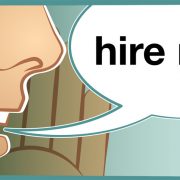5 tips to help you interview
Ever met someone and then realised a while later that your first impressions weren’t 100% accurate? Perhaps because they were more polite than normal or for some reason they were making an effort, then relaxed when they got to know you.
If you interview people for jobs, that’s something you always need to bear in mind. You’re meeting nervous people who want to get through the interview and get that job offer – especially if they’re out of work or they hate their current job and just want to change company as quickly as possible.
Everyone learns from experience when it comes to interviewing. But here are 5 tips to help you immediately:
1 The candidate wants a job. Never forget that. So if they seem positive, enthusiastic and dynamic, remember that it’s about getting the job offer. It’s not necessarily a great indicator of what he or she will be like to work with in 6 months’ time. Ask why – why are you sure this role is the best option for you? Especially if it looks like a similar role to their current job.
2 Don’t fall for standard interview lines. Everyone’s looking for a new challenge. Lots of people are looking to develop their skills and progress their careers. So ask what the candidates mean. What kind of new challenge or development? How realistic is it? Or are they really just looking for a new job and saying these things to impress you?
3 Why do they change jobs? Check why the candidates leave their jobs because it might happen again with your company. Ask what their reasons are for moving on from their jobs. They might say that the company was facing financial problems, they didn’t like changes going on there, they have a new manager and things aren’t working out, they don’t feel like they’re getting any development or career progression and so on. Then think about it: how likely is it that the same situation might happen at your company? If someone hates change, how’s that going to work out if you employ them?
4 Don’t take things at face value. Explore the issue with more questions and get more information. My favourite example of this was a sales rep who claimed credit for a massive growth in sales. After asking a few questions to explore what had happened, it was obvious that he didn’t come up with the ideas and the successful approach – his manager did and he just did what he was told. If a candidate says “we” then always check what he or she actually did. Sometimes the answers help you realise you would be hiring the wrong person and you might want one of their colleagues instead.
5 You’re being interviewed too. You don’t want people leaving an interview with a bad impression of working for your company, especially if they’re likely to share that view with others. Think about the whole experience from the candidate’s point of view – if you don’t like candidate’s sounding negative, then don’t do it yourself. Think about what you’re going to say and remember that you’re selling the company to the candidates as a great place to work and probably for years of their lives. First impressions are important for both sides.
You can see more advice about recruitment here and some anecdotes about when interviews go wrong here.
By Brian



